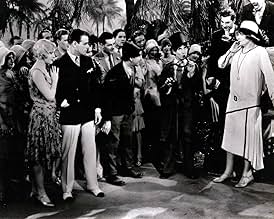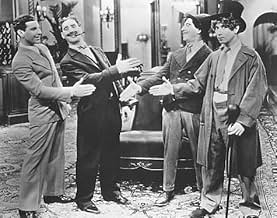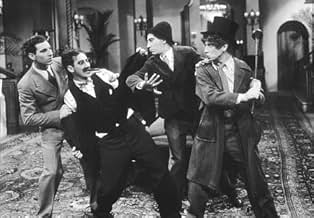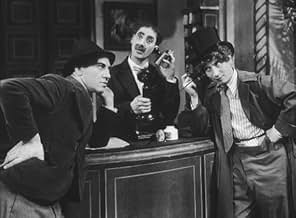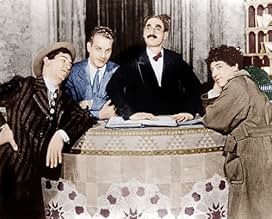VALUTAZIONE IMDb
6,8/10
8549
LA TUA VALUTAZIONE
Aggiungi una trama nella tua linguaDuring the Florida land boom, The Marx Brothers run a hotel, auction off some land, thwart a jewel robbery, and generally act like themselves.During the Florida land boom, The Marx Brothers run a hotel, auction off some land, thwart a jewel robbery, and generally act like themselves.During the Florida land boom, The Marx Brothers run a hotel, auction off some land, thwart a jewel robbery, and generally act like themselves.
- Regia
- Sceneggiatura
- Star
- Premi
- 2 candidature totali
Groucho Marx
- Hammer
- (as Marx Brothers)
Harpo Marx
- Harpo
- (as Marx brothers)
Chico Marx
- Chico
- (as Marx Brothers)
Zeppo Marx
- Jamison
- (as Marx Brothers)
Gamby-Hale Ballet Girls
- Dancers
- (as Gamby-Hale Girls)
Dolores Hope
- Dancer
- (non citato nei titoli originali)
Sylvan Lee
- Bell Captain
- (non citato nei titoli originali)
Barton MacLane
- Lifeguard
- (non citato nei titoli originali)
Recensioni in evidenza
Contrary to popular belief, Cocoanuts was not the first Marx Brothers movie. That honor belongs to Humorisk, a silent film which no longer exists. It was greeted with such hostility that one master reel was burned, and the other deteriorated in a producer's closet. It is difficult to imagine Chico and Groucho in a silent film, and while one might envision Harpo as the ultimate silent comedian, his whistling and horn-honking formed an essential part of his act.
By 1929, however, sound was here to stay, and many silent comics suddenly found themselves out of work. In fact, the only two comedians to successfully make the transition from silent to sound were Laurel and Hardy (Chaplin didn't make his first sound movie until 1940, and was never comfortable with sound). Comedy teams like Stan and Ollie and the Marx Brothers needed dialog; even Harpo communicated with his brothers using broad gestures and the aforementioned honks and whistles.
The biggest story of 1929 (besides the stock market crash) was the Florida land boom. Mr. Hammer (Groucho) is the manager of a struggling hotel, trying to lure customers so that he can sell them Florida lots. Of course, Astoria, Long Island, where this movie was filmed, is not exactly the Sunshine State, and the opening tribute to "sunny Florida" shows us some sand poured on a sound stage to simulate a beach and a painted backdrop of palm trees and coconut. Groucho pursues the rich Mrs. Potter (Margaret Dumont), whose daughter Polly (Mary Eaton) is in love with Bob Adams (Oscar Shaw). Also interested in Polly (or rather, her mother's money) is Harvey Yates (Cyril Ring). Together with his parter Penelope (Kay Francis), they decide to steal Mrs. Potter's expensive necklace and blame it on Bob, easing the way for Yates to marry Polly.
The highlight of the film is the famous "Why a duck?" routine. It's Chico versus the English language, and guess who wins? When Groucho tells Chico that there's going to be an auction, he replies: "I come from Italy on the Atlantic Auction." When Groucho talks about levees, Chico thinks that's the Jewish neighborhood. When he asks him what a radius is, Chico responds that it's WJZ, at that time a popular New York radio station. And when it comes to the word "viaduct" he is totally lost.
Groucho: "Here's a little peninsula and here is a viaduct leading over to the mainland."
Chico: "OK, why a duck? Waya no chicken?" Having been told by Groucho to keep the bidding high during the auction, Chico, in a very funny scene, takes over the whole show, refusing to let anyone else in on the action.
As far as the music is concerned, it is difficult to imagine Irving Berlin writing such drivel as "When My Dreams Come True" and "Monkey Doodle-Do." The former is sung in a duet between Mary Eaton and Oscar Shaw (whom Groucho described as "strictly no-talent"). Indeed it's hard to determine which is worse-Shaw's acting or his singing.
There was a song written for "Cocoanuts," however, that was rejected because it made the show too long. It became one of Berlin's greatest hits. The song was "Always."
The print quality varies from good to fair. It appears that Universal spliced together scenes from several different prints to make one entire movie.
By 1929, however, sound was here to stay, and many silent comics suddenly found themselves out of work. In fact, the only two comedians to successfully make the transition from silent to sound were Laurel and Hardy (Chaplin didn't make his first sound movie until 1940, and was never comfortable with sound). Comedy teams like Stan and Ollie and the Marx Brothers needed dialog; even Harpo communicated with his brothers using broad gestures and the aforementioned honks and whistles.
The biggest story of 1929 (besides the stock market crash) was the Florida land boom. Mr. Hammer (Groucho) is the manager of a struggling hotel, trying to lure customers so that he can sell them Florida lots. Of course, Astoria, Long Island, where this movie was filmed, is not exactly the Sunshine State, and the opening tribute to "sunny Florida" shows us some sand poured on a sound stage to simulate a beach and a painted backdrop of palm trees and coconut. Groucho pursues the rich Mrs. Potter (Margaret Dumont), whose daughter Polly (Mary Eaton) is in love with Bob Adams (Oscar Shaw). Also interested in Polly (or rather, her mother's money) is Harvey Yates (Cyril Ring). Together with his parter Penelope (Kay Francis), they decide to steal Mrs. Potter's expensive necklace and blame it on Bob, easing the way for Yates to marry Polly.
The highlight of the film is the famous "Why a duck?" routine. It's Chico versus the English language, and guess who wins? When Groucho tells Chico that there's going to be an auction, he replies: "I come from Italy on the Atlantic Auction." When Groucho talks about levees, Chico thinks that's the Jewish neighborhood. When he asks him what a radius is, Chico responds that it's WJZ, at that time a popular New York radio station. And when it comes to the word "viaduct" he is totally lost.
Groucho: "Here's a little peninsula and here is a viaduct leading over to the mainland."
Chico: "OK, why a duck? Waya no chicken?" Having been told by Groucho to keep the bidding high during the auction, Chico, in a very funny scene, takes over the whole show, refusing to let anyone else in on the action.
As far as the music is concerned, it is difficult to imagine Irving Berlin writing such drivel as "When My Dreams Come True" and "Monkey Doodle-Do." The former is sung in a duet between Mary Eaton and Oscar Shaw (whom Groucho described as "strictly no-talent"). Indeed it's hard to determine which is worse-Shaw's acting or his singing.
There was a song written for "Cocoanuts," however, that was rejected because it made the show too long. It became one of Berlin's greatest hits. The song was "Always."
The print quality varies from good to fair. It appears that Universal spliced together scenes from several different prints to make one entire movie.
A lot of people don't find The Cocoanuts to be as entertaining as some of the later Marx Brothers films. Maybe not, but it definitely comes close. Personally, I thought this was the Marx Brothers' fifth best film. It's not that it's bad, because it great, but it's just not as good as some of the others, that's all.
As several other people have said, it really doesn't stand up technically as well as most of the others, but that has nothing to do with the quality of the script, which is just great. I truly believe that if I had seen this in 1929, I would have been as hooked on the Marxes as I am now.
There are many great bits in this movie, including the first scene between Groucho and Chico, the Auction, the connected bedroom thing, and the first time we ever see Groucho do his thing with Margaret Dumont. But the only scene in this movie to make my personal Ten Best Marx Scenes is the Why-A-Duck routine. Genius, it's just pure genius. That's my only word for it.
Harpo really doesn't have a lot of good stuff in this movie. He's great in what he doesn't have, but he really shines in Monkey Business and Duck Soup. Those are his two best performances, if you ask me. If you are looking for classic Harpo, I'd suggest watching either of those. Also, Zeppo, obviously, has nothing to do. But then, what did you expect?
This movie has a few actually rather unfunny spots in it, but you can blame that on the fact that this is the brothers' first movie, and they are still getting used to the camera. But it has a lot more comedy than non-comedy and is still a whole lot better than most of the "comedies" that are coming out nowadays.
This may sound a little strange, but if you have never seen a Marx Brothers movie, I suggest watching this one first. It's a lot more enjoyable if you aren't expecting it to be equal to Duck Soup or Animal Crackers. Because it's not. But, as I can not stress enough, it is still worth checkout, and better than than anything they did post-A Night at the Opera.
Well, it's the Marx Brothers best movie of the 20's, anyway.
8/10
As several other people have said, it really doesn't stand up technically as well as most of the others, but that has nothing to do with the quality of the script, which is just great. I truly believe that if I had seen this in 1929, I would have been as hooked on the Marxes as I am now.
There are many great bits in this movie, including the first scene between Groucho and Chico, the Auction, the connected bedroom thing, and the first time we ever see Groucho do his thing with Margaret Dumont. But the only scene in this movie to make my personal Ten Best Marx Scenes is the Why-A-Duck routine. Genius, it's just pure genius. That's my only word for it.
Harpo really doesn't have a lot of good stuff in this movie. He's great in what he doesn't have, but he really shines in Monkey Business and Duck Soup. Those are his two best performances, if you ask me. If you are looking for classic Harpo, I'd suggest watching either of those. Also, Zeppo, obviously, has nothing to do. But then, what did you expect?
This movie has a few actually rather unfunny spots in it, but you can blame that on the fact that this is the brothers' first movie, and they are still getting used to the camera. But it has a lot more comedy than non-comedy and is still a whole lot better than most of the "comedies" that are coming out nowadays.
This may sound a little strange, but if you have never seen a Marx Brothers movie, I suggest watching this one first. It's a lot more enjoyable if you aren't expecting it to be equal to Duck Soup or Animal Crackers. Because it's not. But, as I can not stress enough, it is still worth checkout, and better than than anything they did post-A Night at the Opera.
Well, it's the Marx Brothers best movie of the 20's, anyway.
8/10
The Marx Brothers first motion picture and Paramount's first "all talking, all singing, all dancing" musical will delight fans of the Marx Brothers, musicals and early cinema alike. While dated and somewhat stagey, after all it *was* basically a filmed version of their hit Broadway show, it holds up better than many films of its day. Kaufman and Ryskind, who also wrote the stage show, wrote the screenplay with an eye to making the Marx Brothers wit appear spontaneous and natural. I remember how shocked I was when I first realized the boys were using a script!
The movie is laced with classics of Marxian comedy. The famous "Why a duck?" scene with Groucho and Chico (remember - it's pronounced Chick-o, not Cheek-o, because he was such a womanizer), Groucho answering the telephone at the hotel's front desk (Ice water? Ice water? Peel some onions. That'll make your eyes water.) and Harpo shaking hands with the house detective while all of the hotel silverware falls out of his coat pockets.
Margaret Dumont is priceless as the clueless matron. She claimed in later years it wasn't an act; she really had no idea what the brothers were doing. Regardless, she is the ideal foil for the boys as they tear into "polite" society.
Take a look at The Cocoanuts. You'll see the wellspring from which all that Marx madness flows.
Jon Brian Waugh
The movie is laced with classics of Marxian comedy. The famous "Why a duck?" scene with Groucho and Chico (remember - it's pronounced Chick-o, not Cheek-o, because he was such a womanizer), Groucho answering the telephone at the hotel's front desk (Ice water? Ice water? Peel some onions. That'll make your eyes water.) and Harpo shaking hands with the house detective while all of the hotel silverware falls out of his coat pockets.
Margaret Dumont is priceless as the clueless matron. She claimed in later years it wasn't an act; she really had no idea what the brothers were doing. Regardless, she is the ideal foil for the boys as they tear into "polite" society.
Take a look at The Cocoanuts. You'll see the wellspring from which all that Marx madness flows.
Jon Brian Waugh
Entertaining, but not much of a movie. This first effort from the Marx Brothers seems more like a variety show than a narrative film. The brothers, themselves, are hilarious, especially when playing off each other, but they are forced to share the screen with too many other attractions. There is the singing, romantic lead, his girl, the villainess, her cohort, the surly old cop (who also sings) and even a chorus line of dancing girls thrown in for apparently no other reason than to have dancing girls in the film. The story is flimsy and the supporting cast is awful, but that is to be expected. On the upside, the movie is incredibly funny, and that, of course, is its only real aim. Groucho, Harpo and Chico make the film fly whenever they are given the chance. It just seems like the filmmakers didn't quite yet know what to do with them.
It's been suggested by more than one intelligent film critic that the Golden Age of movie comedies ended with the arrival of sound. Probably the earliest definitive refutation of that is this 1929 film introducing motion-picture audiences to the Marx Brothers.
The great Florida land boom has yet to hit the swampy resort town of Coconut Beach, where hotel owner Mr. Hammer (Groucho) and his assistant (Zeppo) deal with a paucity of paying guests and a platoon of bellhops who haven't been paid in weeks. Hammer manages to placate them ("You wanna be wage slaves? And what makes wage slaves? Wages!") but finds two new arrivals (Chico and Harpo) less easy to sucker while he tries to marry into the wealthy arms of the widow Mrs. Potter (Margaret Dumont).
It may be the Marxes' least revered film from their Zeppo period, but this, the earliest surviving comedy of theirs, provides more than quaint curio appeal or historic interest. It's a nice transfer of their stage act, using one of their successful Broadway plays with nifty direction by Robert Florey and Joseph Santley. While hobbled by early sound technology, there are plenty of neat camera tricks and a less static composition than on offer in the next, more heralded, Marx Brothers film, "Animal Crackers," with overhead shots and cutaways. And the antic wordplay, especially from Groucho, is so fast and dense it provides fresh laughs even after five or six screenings.
I even like the singing and dancing, especially an opening number, shot on a soundstage in Queens, N.Y. but dressed to resemble either Florida or a Haircut 100 video. The "let-us-entertain-you" spirit on ample evidence here evokes a fast-fading pre-Depression giddiness where flappers with wide hips and small chests bat eyes at derby-wearing men glad for the attention.
The Brothers themselves don't really need the help, their craft honed to perfection on stage that they clearly know where the laughs are. Groucho and Chico perform one of their classic routines, the "Viaduct/Why A Duck" number, while Harpo does some prime gurning and props his knee upon every passing dame (and some guys).
Groucho takes a look at Chico and Harpo's lone suitcase when they check in.
"That bag's empty!"
"We fill it up before we leave," answers Chico.
The most glaring weakness of "Cocoanuts" is a lamer-than-usual romantic subplot. Allan Jones and Kitty Carlisle slowed things down in "Night At The Opera," but at least they could sing, unlike Mary Eaton and Oscar Shaw, whose caterwauling here may attract dogs to your doorstep from a mile away. Irving Berlin's score is amazing for its inanity. Though "Monkey-Doodle-Doo" isn't quite as bad as its title, it sounds like "Blue Skies" compared to "When My Dreams Come True" a lifeless ballad reprised five (!) times in the picture, including twice by Harpo (once each on oboe and harp).
Dumont is not yet the presence she became in later Marx films, but Kay Francis offers an attractive foil to the Boys as a designing woman who bites off more than she can chew trying to make a stooge of Harpo. Audiences may start off thinking Basil Ruysdael is just another straight man playing a suspicious cop, but the joke's on us, as we discover by the end.
Speaking of straight men, this may be Zeppo's finest film, if you go along with those who argue he was the master of minimalist comedy, serving up subtle metahumor in the face of his brothers' hi-jinks by literally doing nothing on screen. Not until "Night At The Opera," in which he set a new standard by not appearing at all, would Zeppo be quite this masterful again.
The great Florida land boom has yet to hit the swampy resort town of Coconut Beach, where hotel owner Mr. Hammer (Groucho) and his assistant (Zeppo) deal with a paucity of paying guests and a platoon of bellhops who haven't been paid in weeks. Hammer manages to placate them ("You wanna be wage slaves? And what makes wage slaves? Wages!") but finds two new arrivals (Chico and Harpo) less easy to sucker while he tries to marry into the wealthy arms of the widow Mrs. Potter (Margaret Dumont).
It may be the Marxes' least revered film from their Zeppo period, but this, the earliest surviving comedy of theirs, provides more than quaint curio appeal or historic interest. It's a nice transfer of their stage act, using one of their successful Broadway plays with nifty direction by Robert Florey and Joseph Santley. While hobbled by early sound technology, there are plenty of neat camera tricks and a less static composition than on offer in the next, more heralded, Marx Brothers film, "Animal Crackers," with overhead shots and cutaways. And the antic wordplay, especially from Groucho, is so fast and dense it provides fresh laughs even after five or six screenings.
I even like the singing and dancing, especially an opening number, shot on a soundstage in Queens, N.Y. but dressed to resemble either Florida or a Haircut 100 video. The "let-us-entertain-you" spirit on ample evidence here evokes a fast-fading pre-Depression giddiness where flappers with wide hips and small chests bat eyes at derby-wearing men glad for the attention.
The Brothers themselves don't really need the help, their craft honed to perfection on stage that they clearly know where the laughs are. Groucho and Chico perform one of their classic routines, the "Viaduct/Why A Duck" number, while Harpo does some prime gurning and props his knee upon every passing dame (and some guys).
Groucho takes a look at Chico and Harpo's lone suitcase when they check in.
"That bag's empty!"
"We fill it up before we leave," answers Chico.
The most glaring weakness of "Cocoanuts" is a lamer-than-usual romantic subplot. Allan Jones and Kitty Carlisle slowed things down in "Night At The Opera," but at least they could sing, unlike Mary Eaton and Oscar Shaw, whose caterwauling here may attract dogs to your doorstep from a mile away. Irving Berlin's score is amazing for its inanity. Though "Monkey-Doodle-Doo" isn't quite as bad as its title, it sounds like "Blue Skies" compared to "When My Dreams Come True" a lifeless ballad reprised five (!) times in the picture, including twice by Harpo (once each on oboe and harp).
Dumont is not yet the presence she became in later Marx films, but Kay Francis offers an attractive foil to the Boys as a designing woman who bites off more than she can chew trying to make a stooge of Harpo. Audiences may start off thinking Basil Ruysdael is just another straight man playing a suspicious cop, but the joke's on us, as we discover by the end.
Speaking of straight men, this may be Zeppo's finest film, if you go along with those who argue he was the master of minimalist comedy, serving up subtle metahumor in the face of his brothers' hi-jinks by literally doing nothing on screen. Not until "Night At The Opera," in which he set a new standard by not appearing at all, would Zeppo be quite this masterful again.
Lo sapevi?
- QuizDuring the "Why a duck?" sequence, it seems that Groucho Marx almost calls Chico Marx "Ravelli", which is Chico's character in Animal Crackers. Since they were shooting The Cocoanuts in the morning and acting in Animal Crackers at night, this mix up is understandable.
- BlooperIn the opening scene, Hammer sends Jamison to meet a 4:15 train. When Jamison gets back, he refers to it as a 4:30 train.
- Curiosità sui creditiThe opening credits are run against a background of negative film of the "Monkey-Doodle-Doo" number.
- Versioni alternativeDeleted Scenes:
- When the bellboys are protesting against being unpaid, Zeppo tells them that Groucho has yet to arise at four in the afternoon. His comforting postscript, that Groucho always gets up on Wednesday, precedes his arrival. This scene was shot, but later cut after the preview, leaving Groucho descending down the stairs, still putting on his coat, allowing time to ward off his staff to catch a 4:15 train.
- Another item that was cut from the preview version of the film was a love ballad sung by Groucho to Margaret Dumont entitled "A Little Bungalow". Originally sung in the play by the romantic leads Polly Potter and Robert Adams, the song slowed up the picture.
- ConnessioniFeatured in 46th Annual Academy Awards (1974)
- Colonne sonoreFLORIDA BY THE SEA
(1925) (uncredited)
Written by Irving Berlin
Sung off-screen by chorus
Danced by Gamby-Hale Ballet Girls and Allan K. Foster Girls
I più visti
Accedi per valutare e creare un elenco di titoli salvati per ottenere consigli personalizzati
- How long is The Cocoanuts?Powered by Alexa
Dettagli
- Data di uscita
- Paese di origine
- Lingua
- Celebre anche come
- Los cocos
- Luoghi delle riprese
- Kaufman Astoria Studios - 3412 36th Street, Astoria, Queens, New York, New York, Stati Uniti(Paramount Astoria Studios site)
- Azienda produttrice
- Vedi altri crediti dell’azienda su IMDbPro
Botteghino
- Budget
- 500.000 USD (previsto)
- Lordo in tutto il mondo
- 57 USD
- Tempo di esecuzione1 ora 36 minuti
- Colore
Contribuisci a questa pagina
Suggerisci una modifica o aggiungi i contenuti mancanti

Divario superiore
By what name was Noci di cocco (1929) officially released in India in English?
Rispondi

